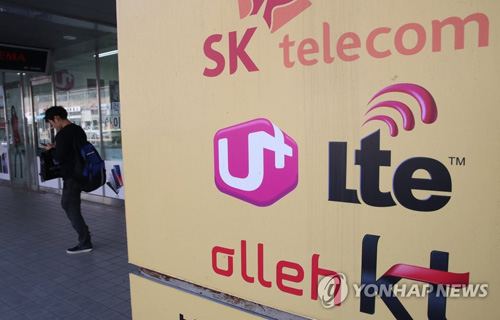Mobile carrier business environment in ‘continuous trouble’…Stronger mobile fee to be down
Jong Ye Lin | yeslin@ | 2018-04-13 10:43:13

By Yonhab News
◇ Mobile cost data disclosure lower than price increase The Supreme Court confirmed on April 12 that it decided to disclose some of the telecommunication fee cost basis data. According to the ruling, the Ministry of Science and Technology and Ministry of Information and Communication will disclose the balance sheet, profit and loss statement, and sales statistics of the business report among the basis for calculating the cost and the investment fee for the cost calculation from 2005 to 2011.
When the data is released, communication costs for mobile carriers will be further increased. Based on the data to be released this time, it is possible to calculate the cost reimbursement rate of the carrier. In the meantime, NGOs have been claiming that mobile carriers need to reduce their mobile costs if the cost-reimbursement rate of mobile operators is more than 100% based on the cost reimbursement rate. The cost reimbursement rate is calculated by dividing the operating revenue for a certain period by the total cost, which is the sum of the project cost and the investment fee. The 100% cost reimbursement rate for that year means that the combined operating expenses and depreciation expenses of the year to provide the service and the investment fees were collected as operating income.
However, Lee said that the cost reimbursement rate is not a standard for judging the profitability of telecom companies or the appropriateness of telecom expenses. An official said, "The cost reimbursement rate is used exclusively by public corporations that supply water or electricity." "If the cost reimbursement rate is low, it is the value the government uses to conserve taxes."
The carrier believes that the cost reimbursement rate differs depending on the investment period. This is because the price is low in the initial stage of network investment and becomes high when it is stabilized. Another mobile operator said, "Second-generation mobile communication (2G) and third-generation mobile communication (3G), which are unveiled at this time, have high cost reimbursement rates, but in the case of LTE, KT and LG U + 100% is not possible. "" If this is the case, the price should be set higher in the early stage of commercialization of 5G. "
◇ Telecommunication, universal fare system, even more pressure on the mountains in the past - mobile operators are sighing that it is getting harder to do business as the ruling goes " The government has put pressure on household telecom prices as a major policy, and telcos are currently under pressure to cut rates altogether. We have tried many ways, such as improving the agreement system with self-help measures and offering low-priced unconventional fare plans, but it is not enough.
The biggest problem is that mobile telecom revenue is deteriorating. Last year, we raised the discount rate from 20% to 25%, and we are under pressure to implement the universal fare system. The universal fare system provides about 200 minutes of voice calls and 1GB of data at a monthly fee of 20,000 won. The government plans to submit a revision of the Telecommunications Business Act, which will include the introduction of the universal fare system in June this year, to the National Assembly. Currently, the Ministry of Information and Communication of Mukhwa has passed the report of the results of the Household Telecommunication Conference, which includes the contents of the universal fare system, to the National Assembly, and the Regulatory Reform Committee plans to review the universal fare system later this month. Even if it does not pass, the carrier is expected to strongly demand alternative measures.
An industry analyst stated, "The telecom companies that are investing in a number of trillion won for the commercialization of the 5G are inevitably stalled." It is also important to cut telecom costs, but restricting too much in the highly competitive telecom market can weaken the competitiveness of mobile carriers" he said.
By Jong Ye Lin yeslin@
